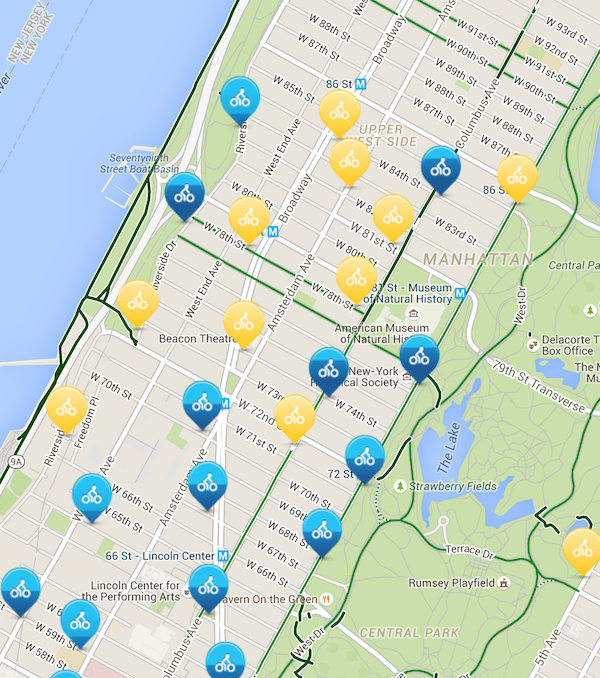 I hear today is Podcast Day. And to celebrate, Harvard has a story which acknowledges that much of the early work of podcasting happened there. It's true, but I think the story, and the role that Harvard played, and others, is somehow lost.
I hear today is Podcast Day. And to celebrate, Harvard has a story which acknowledges that much of the early work of podcasting happened there. It's true, but I think the story, and the role that Harvard played, and others, is somehow lost.
So I recorded a 20-minute re-telling of the tale of podcasting, from my point of view. Starting with my meeting with Adam Curry in 2000 in NYC, early experiments with Grateful Dead music, Berkman, BloggerCon, Chris Lydon, with a hat-tip to Doug Kaye and Steve Gillmor who were also doing early podcasts at the same time.
Then to the summer of 2004, when I started Morning Coffee Notes, and proved that someone who isn't a radio star can make something interesting enough to listen to, and that roughly is when the idea really started to take off. Adam's Daily Source Code came in August, then Trade Secrets, the iPodder mail list, the term podcasting, Tony Kahn and WGBH, and the first 20 podcasts. Someone should make a list and put those names on a wall, because when they started, that's when podcasting really was ready to go. All the previous steps were necessary, the technology, the idea of a series of interviews, the talk show format, and the involvement of NPR.
Harvard provided an environment where this could happen, where the people could come together. I would say you have to credit Charlie Nesson, Jon Zittrain and John Palfrey for setting up that environment, trusting us to do something good with it. I remember the day I started there, they gave me a key to the office so I could use it any time I wanted. JP got me the space I needed for BloggerCon and the Thursday evening meetups, and helped explain what we were doing to the other parts of the university that wondered if all this would lead to something worth doing. Now we can close the loop, clearly Harvard feels it was. So we should do more of it! Let's keep digging. A campus like Harvard's is an incredible experimental kitchen for cooking up new stuff like podcasting.
PS: As with all my podcasts this one is imperfect. The last minute or so was cut off. How did it happen? No clue! But the story is still there, and I think it's a good one.
PPS: I cross-posted this piece on Facebook using the new Notes feature.
Re this column by Public Editor Margaret Sullivan.
A NYT senior editor, Trish Hall, has a new assignment: 1. Watching for articles that might lend themselves to sponsorship and 2. Develop projects that will be attractive to sponsors.
Some thoughts
This is good, it's time to try out new ideas.
Re sponsorship, I believe the owners of the NYT should be the sponsors of all articles and projects.
Bring more creativity into the news process. Look for unobvious stories that don't have commercial proponents (yet) but obviously have business potential, because of change.
That's where the ownership should invest. In the new business opportunities the reporters dig up (because they should be looking for them, that's real news).
I don't think it's a conflict for the owners of the newspaper to read their own product.
News is about change. Go find related businesses, and invest.
I think the breakthrough that's available is so obvious it's hard to see. The people who own the news org are business people. They must think that way. Use, and manipulate the info flow, but maintain its independence. The facts you uncover will be open to everyone, even competition.
How do you make money? Buy low, sell high.
Really is an idea here
Not sure how coherent all this is. There's an idea here, and expressing it involves some hand-waving, and eye contact. Or maybe you have to stare at the page. Or go for a walk. Breathe some fresh air. Sleep on it?
But there really is an idea, and it doesn't compromise the independence of journalism, but the role of journalism is different, and the people who own the news org must think like people starting new businesses.
The owners
BTW, to amplify on this item: "I believe the owners of the NYT should be the sponsors of all articles and projects."
The owners would be all the shareholders. If I saw the NYT intelligently investing in businesses that start up because of new things happening in the NYT community, then I would be very likely to want to own the stock. So to think of "owners" as a static thing would be to miss the opportunity.
 I haven't bought a new router since 2007 or so. I wonder if routers have gotten better? And if they have, why not spend $100 or so to get a new one? I could always use a little more speed copying stuff around the LAN.
I haven't bought a new router since 2007 or so. I wonder if routers have gotten better? And if they have, why not spend $100 or so to get a new one? I could always use a little more speed copying stuff around the LAN.
So I did a little looking, and judging from the reviews on Amazon, most of the popular routers came out four or five years ago. And they cost about $30. Is that right?
I have modest needs. Just need to hook up a few computers over wifi. They're all Macs, iOS or Android devices. No need for USB or multiple networks, etc.
What's a good router to get?
Look at this screen shot.
See what Twitter is doing? I replied to my own tweet with more info, Twitter must have thought it was part of a tweetstorm so they linked the two messages. How about letting me type a few paragraphs with a nice expand/collapse wedge next to the extra stuff, instead of jumping through these ridiculous hoops.
Optimize! Factor! Pave the cow paths! Do your freaking jobs! Software is supposed to follow the users. Here the users have been leading for years, and the product refuses to follow. Bad software evolution.
PS: For comparison, look at how I did the very same thing on Facebook. Much more natural, easier on everyone.
 First, check out this article in Variety. I had not heard of any of this.
First, check out this article in Variety. I had not heard of any of this.
I do think Twitter plus TV is potentially huge. But I also think this opportunity has been out there for a long time. They could have moved so much more decisively.
Imagine for example a "Twitter for Breaking Bad" -- when the show was on you could log on to it, and not have to worry about spoilers. Also there would be no need for hashtags. Just stream of consciousness of barks, sniffles, bluster and agony.
The TV show would almost certainly have had to use and promote the Twitter channel, a couple of years ago, because of Twitter's dominance. But that might be fading a bit, Twitter might not be the best way to do this for much longer.
There's no doubt that the back-channel of TV is going to be huge. The biggest thing ever. It should have already happened it's so huge.
PS: Cross-posted on Facebook using their new Medium-like editor.
Harbin Hot Springs and Yogi Berra are much on my mind this morning.
Harbin, because I used to go there regularly in the 90s. I was exploring massage, meditation, shiatsu, myself, existence, stuff like that. And I've always been a baseball fan, and coming from NYC, Yogi Berra always loomed large.
Anyway, the two met. I told my Harbin friends, many of whom had been to India, and generally knew more about spirituality than baseball, about our famous American teacher, Yogi Berra. I recited some of his teachings, which made a lot of sense in the Harbin context. Things like "you can observe a lot just by watching" -- one of the hits.
At Harbin we were trying to get out of our trance, our movie, and into the moment. It may sound cute, but there are a lot of times where you can benefit from a reminder that you must observe existence, not your story about what existence is.
American spirituality was perfectly captured by the great baseball teacher Yogi Berra.
Harbin died last week in the Valley Fire, and Yogi died yesterday, in New Jersey.
Namaste y'all!
Dave-ji
Every so often a product comes along and focuses a huge amount of attention on itself.
Twitter was like that. Before that Netscape and its offshoots. Before that Sidekick and before that spreadsheets. These are just in my own area, I'm sure games have their own products that completely gain the focus. And graphic software like Photoshop. Cars and living room furniture too.
They influence everything that follows, I think in a good way.
Slack is doing that now.
There  are going to be a huge number of Slack-like things. We will get tired of hearing people say that. But there are some important ideas in there.
are going to be a huge number of Slack-like things. We will get tired of hearing people say that. But there are some important ideas in there.
Most important imho are the integrations.They define a set of web services that could plug into lots of things. And lots of things could be created to have those services plug into them. That's the part that interests me the most.
Slack has the potential to be one of the biggest coral reefs of all time. Honestly I don't see how it could not become a coral reef. But I always am one to wear the rose-colored glasses. Things never turn out as well as I think they should.
Slack's influence and the new open interface we got a look at from Facebook, are making the end of 2015 shape up as one of the most interesting times.
 Late yesterday Facebook released docs explaining how Instant Articles works for publishers. It's good news. They have, as I speculated earlier, built their system around RSS. This means there can be interop between all the big companies --Twitter, Google, Apple, Facebook -- now building new news systems.
Late yesterday Facebook released docs explaining how Instant Articles works for publishers. It's good news. They have, as I speculated earlier, built their system around RSS. This means there can be interop between all the big companies --Twitter, Google, Apple, Facebook -- now building new news systems.
This comes with a caveat. I haven't yet been able to test Facebook's RSS support. Once I have, I will be able to say that Facebook is a fantastic company for having the guts to use an open format for their new publishing system.
To publishers and bloggers -- this is a big deal because it means that the same feeds you generate to post stories to Facebook can be used for other sites. It's a very strong statement. No publishing silos. Let news flow where it wants to. And let competitors arise who may do more interesting and useful things with news than the big companies can.
By betting on RSS, Facebook says bring on the innovation. Startups, news corps, open source developers, kids in Dallas high schools, anyone can experiment. It's too early to lock down innovation in the flow of news.
New editing tools that publish to all the systems can come about. Finally! Let's get some new life in blogging software.
The same feeds you that provide data to Feedly, and to my rivers, can be used for Facebook.
I wrote about this in my piece about balkanization last week. It's possible, even likely, that we'll avoid the mess that seemed likely only a week ago.
Stay tuned for more news.
PS: Cross-posted on Facebook.
I've
 been a Mets fan since 1962.
been a Mets fan since 1962.The Mets have a philosophy. Winning isn't everything. If we didn't have this philosophy we'd break.
That said, there is a feeling that "this is the year." The year for what? Well, it could go either way. It could be a year of triumph of good over evil, or it could be yet another mile on the Mets trail of tears.
Reminds me of a story from the final game of the 2000 World Series. A boy on the 7-train riding into the city, wearing a Mets hat and jersey. Crying. Why oh why? I imagined the kid following the games all season as I did when I was his age. An older wiser man said: "Son if you're going to love the Mets you're going to be doing a lot of that."
I was puzzled as to why the Mets tore down Shea Stadium. At first I thought it was a bad idea. Does the Catholic Church tear down the Vatican to get some new restaurants? Then I realized we had to tear down the stadium. Once the Yankees celebrated their world championship in Shea in 2000, its fate was decided. We can't play here. It's tainted. A dirty place. So down comes Shea and up goes CitiField. They brought the stupid home run apple thing along. Not sure that was a good idea.
Well the Yankees beat the Mets two games out of three in the weekend Subway Series. It was the way we lost that made me wonder if this is the year for triumph of philosophy, or one more defeat at the hand of the infidels.
Then I remembered the next games are with the Braves, Phillies and the Reds. Three teams the Mets can beat. I think. I hope. Please. I don't want to cry again this year!
Your humble servant,
Dave
 I love riding in NYC. Both on my own bike and using CitiBike. It's exciting times, because CitiBike is moving uptown. Now it's possible to ride from anywhere in lower Manhattan or Brooklyn to the uptown museums on both sides of the park. There's also a new connection to Queens.
I love riding in NYC. Both on my own bike and using CitiBike. It's exciting times, because CitiBike is moving uptown. Now it's possible to ride from anywhere in lower Manhattan or Brooklyn to the uptown museums on both sides of the park. There's also a new connection to Queens.
Last week I heard WNYC, the local public radio station, asking for bike riders to take pictures of cars blocking bike lanes. They want to understand and document the extent of the problem. I love this so much, both as a bike rider, it makes it possible for me to help make riding work in the city, and as a news developer, I strongly believe this is the kind of project news organizations must undertake, to provide more value in the new context of news.
Not everyone in NY will agree, but I want to see bike riding work here as I've seen it work in Copenhagen and Amsterdam. There, if you, as a pedestrian, step out into bike traffic, you're as likely to get injured as if you walked out into car traffic. This is a good thing! It makes biking work as a means of transport in these cities, equal to cars in every way. That makes for a more human and more sustainable city.
In NYC, pedestrians often use the bike lanes as extensions of the sidewalk. And drivers park cars, buses, trucks and ambulances in bike lanes. I've never seen a cop giving tickets for this.
So I've taken two sets of pictures. One on West 54th St, an west-east bike lane street, and the other on Central Park West, an excellent south-north route, if the bike lane wasn't blocked by cars. This will become even more important now that there are three CitiBike stations at 66th, 72nd and 77th streets.
I've published all my pictures both on the WNYC site and on Facebook.
Why this is so important
This is a perfect example of the kind of project news will thrive on in the future. Helping citizens be active in bringing about change. They don't have to be pro bike or pro car. Just help everyone share what they see and think. I love taking the pictures and sending them to WNYC -- makes me feel powerful.
People often ask why I don't run ads on Scripting News.
Basically, I don't want to compete for the attention of my readers.
A story to illustrate. Imagine you're a car salesman. You have a customer doing a test drive. In the car, the engine is running. This is the moment you prepared for! You're about to close the deal and be a sales hero for your team!
But first, you turn on the radio and play a Starbucks ad. It offers a special price on a latte if they drive to the store. Great, you just sold them a $3 drink, but I was going to sell them a $35K car.
I see running ads on my blog as picking up loose change that's fallen out of peoples' pockets. I want to hit a home run. I'm swinging for the fences. Not picking up litter.
 Yesterday's piece about web advertising was a big hit in the tech industry, and drew questions and criticism from people in the news industry. All of it is good. I like it when my writing gets people thinking. That's the greatest reward. So now here are some more, hopefully thought-provoking, observations.
Yesterday's piece about web advertising was a big hit in the tech industry, and drew questions and criticism from people in the news industry. All of it is good. I like it when my writing gets people thinking. That's the greatest reward. So now here are some more, hopefully thought-provoking, observations.
In a piece I wrote in 1997 about web economics, I offered Netscape as an example of a news site with a solid business model. Everyone coming to the site needed a web browser, and Netscape was selling one. Perfect. So just by promoting news through their site, no matter what the topic, they built demand for a revenue-producing product. They were also building the connection in the market between their brand and the activity of seeking out news. Just drawing people to the site made the name Netscape more famous and therefore more valuable.
I offer my own experience as an example. I started writing my blog because I loved to share what I learned about technology and the people using and creating the new medium. But along the way I also created products, some of which were sold, generating a fair amount of revenue. In the end I was very well compensated, financially, for the writing I did.
I am still doing that here. Writing blog posts and writing software. I hope to make more money, but that isn't why I do it. I do it because writing software and writing about software is what I want to do. I would do it even if it didn't pay.
John Gruber of Daring Fireball did a similar sort of thing with Markdown. Could he have created such a powerful standard, on his own, without his widely read blog? (BTW, I'm using Markdown to write this post. I like the way it handles numbered lists.)
Joel Spolsky wrote blog posts and books that captivated the imagination of developers. He turned that into Stack Exchange, a very valuable company, and Trello, a popular and presumably profitable product.
I just read an article about how Slack was used at a conference to facilitate pre- and post-conference discussions, and (key point) helped people meet more interesting people at the conference. This is really what the net is about.
Conferences and networking, same thing. Exactly the same thing. All real-world conferences should have semi-permanent installations on the net. There's no reason that XOXO 2015 can't keep going for years and years.
This is how I first met Robert Scoble. He was the chair of a conference I was going to speak at. He ran a mail list for the speakers, before the meetup, and pushed on-topic links to us. When we got to the show the discussion was already underway.
I used to run my blog posts through email. I'd send each piece to random groups-of-eight. Sometimes long interesting discussions would grow in the small groups. Randomness can be a great connector. It helps you meet people with widely varying backgrounds.
People often ask why I don't run ads on Scripting News. Basically, I don't want to compete for the attention of my readers. More here.
Here's an idea for a geography-based news org (i.e. a newspaper) -- give readers a place to talk about movies, and then sponsor movie nights based on their interests. Encourage people to provide lists of their favorite movies and do some collaborative filtering. Then collate the reviews and present them alongside your professional reviewer's post. Work with the movie industry. It can have incredible promotional value, for the movie, the theater, you, the whole idea of going to the movies (as opposed to watching on your home TV, phone or tablet). What's great for your community is they get to meet people who like the same kinds of movies they do. And you get to know who they are! It's such a huge, easy win, all-around. That more local news orgs haven't done it tell you how stuck in old print models we still are. This is an example of a kind of idea that really can only blossom online.
And once you do one activity there can be dozens more. Amateur car and cat shows. Bowling night. Ski trips. Outings to baseball games.
No doubt a lot of this will ultimately be about sex (which is good!), but there are also intellectual and athletic activities that people enjoy too. We're a social species, and we're more isolated these days because of the net, and that makes us yearn for more gratifying social experiences. The net can help there too. Facebook is a huge first step in that direction, but there will be lots of new, more specific activities, all around making human connections, in the years to come. And news can and should play a big role in bringing that about.
If you can create a service, news or otherwise, that helps people meet new friends, you've got a printing press for money. And most news orgs, if they just think about it, can find a lot of ways to make introductions between their readers.
PS: Cross-posted in full text without links on Facebook.
I think of advertising as "unwanted commercial messages."
The unwanted part is key. I do a lot of seeking of commercial information using the web. We all do, all the time. That's how business works on the web.
It seems to me that news orgs have to figure out how to make people come to their sites seeking commercial information. They are in the information gathering business after all. Let some of the information you seek pertain to me spending money wisely or in fun or gratifying ways.
What if I could go to my local paper to buy a house. I'm always interested in buying real estate. If they sold me a house, then they would make money from the sale. A lot more than a few cents they make off me every year for the ads I ignore.
Maybe not a house. How about Internet connectivity. Or a movie date. Someone interesting to go to a baseball game with. These are things I pay money for. I pay a lot of money to go to games. How much I enjoy it is directly proportional to who I go with. All these things involve connecting people with people. So much money to be made here. Why doesn't the news industry help me meet interesting people?
Maybe that's why Facebook makes so much money. Just sayin.
I also am always in the market for better Internet connectivity. Could the NY Times help me there? We all live in the same city. They help me find good restaurants. Maybe if they helped me find better Internet, or if they can't, because it doesn't exist, if they helped to bring us better Internet by constantly beating the drum for it, which is something they can do and seem to like doing -- that would be worth paying for. Beat the drum for new commerce, and then make it possible to buy the thing through your site?
There are honest ways to make huge money on the Internet. I think the message you're getting from your readers is that advertising is dishonest. The ads you show us net-net are junk. Jokes. Sad. Please stop this.
Maybe the more distilled message is this: Stop talking so much. Listen.
Update
There's a follow-up to this post.
 The ad blocker thing feels like the user rebellion over copy protection in the late 80s. Disks used to have bad tracks that made it impossible for the OS to copy them. It wasn't hard to write utilities to copy the disks, so it didn't really work. One day the users decided, en masse, all the more impressive because this was before the web, no more. They cut up the disks and mailed them back. Right away we knew it was over. You can't be in business and be so hostile to the people who love your product. It just didn't work.
The ad blocker thing feels like the user rebellion over copy protection in the late 80s. Disks used to have bad tracks that made it impossible for the OS to copy them. It wasn't hard to write utilities to copy the disks, so it didn't really work. One day the users decided, en masse, all the more impressive because this was before the web, no more. They cut up the disks and mailed them back. Right away we knew it was over. You can't be in business and be so hostile to the people who love your product. It just didn't work.
Balkanization is a "pejorative geopolitical term, originally used to describe the process of fragmentation or division of a region or state into smaller regions or states that are often hostile or non-cooperative with one another."
 We're at an interesting junction, with several competing incompatible distribution systems for news about to be introduced. I've probably got as much experience with this process as anyone, and I can see how this is shaping up, in a bad way, for pretty much everyone. Here are some bullet points leading to a conclusion, a set of proposed action items for Facebook.
We're at an interesting junction, with several competing incompatible distribution systems for news about to be introduced. I've probably got as much experience with this process as anyone, and I can see how this is shaping up, in a bad way, for pretty much everyone. Here are some bullet points leading to a conclusion, a set of proposed action items for Facebook.
Each of the major tech companies is planning as if their news system is the only one anyone will ever need. I'm sure it feels that way, from their internal point of view. People who work at big tech companies are greatly affected by the gravitational pull of the social structures of those organizations.
When I visited Microsoft in 2007 as they were about to launch their RSS initiative, they were sure that when their new Windows OS shipped, immediately the vast majority of RSS users would also be Vista users, so they felt free to ignore the installed base and prior art. It didn't work out that way, so there were new ways to do familiar things. Windows did not become the RSS OS as they expected it would. Too bad, RSS could have used a friend in the OS business.
I also saw this play out in the process that led to SOAP, which was simple protocol that was eventually obscured by a maze of messy specification languages. Underneath all the WS-junk there was a beautiful idea, that we could all build systems that worked with each other out of the box. This is known as interop. Balkanization and interop are basically opposing forces.
Big tech companies really are all the same in this way -- they want to be able to claim to be compatible with open standards, without the problems that come from interop. Interop makes it hard to sell expensive software and services when a competitor could undercut your price or provide a more efficient or useful product. Life is easier for the bigco if they can do anything they want at any time and the cost of switching is prohibitively high.
Users, when they are aware of the pitfalls of balkanized markets, are very much in favor of interop. The news industry is on the verge of learning those pitfalls, over the next few years, if things don't turn radically in the next few months.
Balkanization is an important concept. It's what happens when there are several competing confusing ways to do the same thing, each of which has some support in the market. If you want to participate, you have to support them all. It's often impossible, by design, as the vendors try to control their partners by throwing ever more complex requirements at them.
Google has apparently teamed with Twitter making an announcement by leaking it to Re/code. They claim their approach will be "open" but no one but them and their partners (maybe) have seen what this might mean. I'm skeptical. Given past experience I expect there will be a hidden trap door in the open-ness, a way for Google and/or Twitter, to foreclose on it, if it even exists at inception. Both companies have awful track records in this area. Twitter unilaterally nuked their developer community in one day. Google camped out in and dominated the RSS reader market, then killed the product. Nice. You trust these guys? You need to see a shrink. But they have standing, and anything they use will have to be supported, it seems. Google has two excellent news products, Google Now and Google News, and Twitter is the current leader among tech companies in news, but Facebook looks poised to quickly become #1, which is presumably why Twitter is in motion now.
Apple. Their approach builds on RSS, somehow, but again, the track record here is pretty bad. And Apple has never had a successful product in news. But they are Apple. And the mobile market is where the action is, and Apple has a lot of power when it comes to what people do with mobile devices.
Facebook. Their announcement and demo of Instant Articles started the push by all the other big tech companies to try to own news distribution on the net. It's why we're having this discussion in the last part of 2015.
RSS. The open news distribution format, quietly doing as much work as any of the tech companies, controlled by no one, guaranteed not to make your software obsolete, and free to use. RSS could easily be the basis for a new open market with interop everywhere, and no single company controlling anything. No wonder the tech industry hates it!
While I have very little insight into what Apple, Google and Twitter are doing, I have some clue how Facebook's news system works. I signed a NDA last summer, and have been briefed a few times as work has progressed. My opinion: If Facebook wanted to settle this, they could, right now, and prevent the crazy balkanization we're about to embark on. That's why it's a good time to write a blog post. It might inspire them to do something great, or it could serve as a milestone for an I-Told-You-So post in 2018 or 2019. I don't think Apple, Google or Twitter will listen to me, but Facebook might.
I'm pretty sure Facebook's news system is built on RSS. If so, please tell everyone that, now. And show us how to plug in. Not just famous news orgs, also bloggers, and makers of blogging tools like WordPress and Tumblr. I have my own tools that I'd like to be part of the Facebook network. I've seen the impact of having full text on Facebook, vs linking to a story on my site. But I won't give up my blog, it's important to me not to become dependent on Facebook for publishing. Everyone who writes seriously has to feel this way, imho of course.
I want an API so I can publish to those sexy Medium-like Facebook posts. Both because they're beautiful and I know people want to read that way.
Google, Twitter, Facebook and Apple can make an awful mess of news on the net that will take a decade or more to clean up. News won't get back on track until Zuck is in his 50s. Or, Facebook could do the gutsy thing, and tell your big competitors that you're on the side of really irrevocably open systems, with no hidden card up your sleeve (that we all can actually see) and trust developers and your momentum to carry you into the leadership position in this market.
Facebook + RSS would be absolutely unbeatable. Apple and Google would never be able to escape the pull.
 I want to have a tech conference where everyone on stage is over 50. People who accomplished something when they were in their 20s and 30s, talking about what they've seen in their lives.
I want to have a tech conference where everyone on stage is over 50. People who accomplished something when they were in their 20s and 30s, talking about what they've seen in their lives.
It's time to start this process because in tech we throw out so much experience, it's why progress is so slow. Also because these people are approaching retirement, and we've already lost a few of our heroes, people who I would love to have interviewed.
I'd look for people who were not the widely-heralded heroes of their day, esp people who didn't make billions of dollars. People whose work really added up to a lifetime of achievement.
This would be a non-commercial conference, and recurring, and very low or no cost. A university would be ideal. I've done similar conferences at Harvard and Stanford. Both schools have excellent facilities for this kind of thing.
It would be webcast of course, available for perpetuity on YouTube and wherever else people might like to put it.
We'd encourage young technologists to participate as well, in meaningful ways. To create cross-pollination of ideas, so we don't lose so much of the experience we fought so hard for.
What would be in it for a university? Having these ideas flow through your campus would give you a public connection with accomplishment in technology, which means a lot more than teaching your kids how to "code." Here we would teach how very successful people thought about technology, and turned those ideas into results on a societal level. At the time, people thought techies were weird, but now we know they were actually visionaries.
PS: This post began as a Facebook thread.
What is a flash conference?
 I've long felt that we need to be able to convene conferences that are timely, when news is happening and change is imminent. So many conferences are stuffy affairs with well-rehearsed positions, they're not as interesting as conferences on topics that are fresh, where the events have just happened or are still happening. When things are coming to a head, it's a good time to have a flash conference.
I've long felt that we need to be able to convene conferences that are timely, when news is happening and change is imminent. So many conferences are stuffy affairs with well-rehearsed positions, they're not as interesting as conferences on topics that are fresh, where the events have just happened or are still happening. When things are coming to a head, it's a good time to have a flash conference.
It's the kind of thing a university can do well. We did these sometimes when I was at Berkman Center a little over ten years ago. You're starting to see permanent installations around convention centers, evolving toward what I called HyperCamp, a 365-day-a-year conference for bloggers and press people, and people who make news. That's also a context where flash conferences make sense.
Web ads coming to a head
You get a sense that things are about to change in a big way because finally the web advertising business has gone too far, users are doing something about it, as is tech.
When Facebook says we need Instant Articles because mobile latency is such a huge impediment to flow, that's only half the story. The other half is omitted because it's such an uncomfortable topic -- web ads are making the web unusable.
It would be great to have a 1/2 day series of discussions with people who have been thinking and writing about this stuff. I'd like to see Doc Searls moderate a panel with editorial people from sites with ridiculous advertising. How many editorial people run ad blockers on their own sites? Have you ever been interrupted by a video that starts playing in a tab you opened an hour ago? Did it interfere with something you were doing?
Is the purpose of the web to pay your salary or does it have some greater mission? (The question should be asked with a certain amount of sarcasm.)
 I would like to write software that people can run 100 years from now. Clearly that's not going to happen.
I would like to write software that people can run 100 years from now. Clearly that's not going to happen.
Ward Cunningham tells a story about how he wrote Hypercard apps for his kids as bedtime stories. He would love to be able to run that software today, share it with his kids and grandkids. But there's no way to run it. He says this is wrong. I agree, emphatically.
We can still play music written by people who lived in the 1700s. You can visit buildings that were built 500 or more years ago, and use them the more or less way they were originally designed to be used. But for some reason we can't run software written 25 years ago. Technically, if we wanted to develop in a way that made this possible, we could. But each generation apparently believes there's not enough value in the software written by previous generations. Which probably has something to do with why so much know-how is lost every decade or so.
This originated in a Facebook thread started by Doug Purdy.
PS: Look at this thread about Turbo Pascal for an idea of how much interest there is in the idea of running software that was written not so long ago. When I posted the link, I had no idea the kind of response it would get. Turbo Pascal was wonderful. And they didn't invent new syntax. A very important concept.
CitiBike has made it up to 84th St and Columbus Ave.
Why don't they have a huge station in front of Zabar's?
 I posted this as a tweetstorm using pork.io.
I posted this as a tweetstorm using pork.io.
This is the moment when news turns into an ugly trench warfare battle ground, as with the famous Java wars or browser wars of the 90s. Only uglier because the barrier to entry is so ridiculously low, so there will be so many more combatants. I think the news execs are babes in the woods. Facebook will win for sure. Google and Apple have nothing to lose. Twitter has everything to lose. Jeff Bezos is sitting this out smiling with his Washington Post above it all. Maybe Rupert Murdoch will sue someone. What an epic mess is brewing! And it's so freaking unnecessary. Getting out my popcorn, because I have no stake in this.
14 years ago today was a big news day, including here on Scripting News.
Under a piece I wrote about future-safety, Adam Gerstein posts a comment suggesting today is a good day to take a look at this.
Most of the history is gone
Try clicking on the links in the weblog for this day 14 years ago. You'll find most of the stuff is gone. Gerstein says a lot of it isn't in the Internet Archive either.
I've tried to sound the alarms. Every day we lose more of the history of the web. Every day is an opportunity to act to make sure we don't lose more of it. And we should be putting systems into place to be more sure we don't lose future history.
 This morning, an announcement from Twitter, in conjunction with Google, that they're going to do an "open source" implementation of Facebook's Instant Articles. A few comments.
This morning, an announcement from Twitter, in conjunction with Google, that they're going to do an "open source" implementation of Facebook's Instant Articles. A few comments.
They continue to chip away at the 140-char limit. Why not just go all the way? The 140-char limit is holding them back in their most important application, news. This is just a complicated way of working around the limit.
Don't confuse "open source" with "open." If it's open source, presumably we'll all know how it works. That's good, of course. But the channel will not be open to anyone who wants to use it. They're careful to disclaim that.
This is a classic second-mover tactic. Facebook went first, Facebook owns the high ground. So challenge Facebook to be "open" by throwing a little confusion at the press. But...
Facebook can and should beat them to it. I'm pretty sure their implementation is just RSS, which is already both open source and open to everyone to use. And stable, easy to build on.
I would like to be able to use this channel to publish, and include the capability in my publishing tools. But Twitter isn't saying anything about that. They're working with another big company, Google. Not encouraging for its wounded developers, a group that Twitter needs to make peace with.
This would be a good time for the leaders of the journalism world to get involved, publicly. No one wins with the tech platforms playing favorites as they like to do. Let's get back to some semblance of the open web. Twitter, Facebook and Google grew out of the open web. Yes, they're all really big now, but they should still be part of the open web, so that new social networks can blossom. We're getting kind of stuck here. Long-term that will not be good for the leaders of the tech world, as history has shown.
There are a couple of well-rehearsed ideas that come up when you say Twitter's 140-character limit is a bad idea.
The limit enforces brevity and makes people better writers.
If they didn't have the limit it wouldn't work with SMS.
Rebuttals
Here, once and for all, are the rebuttals to these ideas.
If you want quality writing, don't look to Twitter. Most of what you read there is crap. Unfunny humor, put-downs, highly abbreviated rallying cries that no one rallies to. Pathetic stuff really. If the goal of Twitter was to promote quality writing, then Twitter is a failure.
The best guarantor of quality is your ability to unfollow. If someone is boring you, or offending you, just unfollow them. If that doesn't do it, mute them. And in true emergencies you can block them. You have all the tools, without the 140-char limit, to keep the too-long writing out of your feed.
If you like SMS, great. You'll get the first 140 and a link to the rest. Which is more or less exactly how it works today, for everyone, even people who never use SMS.
Bonus
If the 140-char limit is such a great thing, why do you see posts like this on Twitter??
 My career as a writer started in the midst of the collapse of the corporate system that seemed certain to dominate open standards for all time, back in the ealry days of the web. I had ridden the wave of the Apple II, IBM PC and then the Mac. Just when it was assumed to be impossible for independents to be independent, boom, there's the web, the product of a single mind, kicking the ass of all the titans of tech. Once I saw that I could draw a line, back to the previous insurrection, the one which my career started with in the late 70s. THis is a cycle! Thank god.
My career as a writer started in the midst of the collapse of the corporate system that seemed certain to dominate open standards for all time, back in the ealry days of the web. I had ridden the wave of the Apple II, IBM PC and then the Mac. Just when it was assumed to be impossible for independents to be independent, boom, there's the web, the product of a single mind, kicking the ass of all the titans of tech. Once I saw that I could draw a line, back to the previous insurrection, the one which my career started with in the late 70s. THis is a cycle! Thank god.
A comment on a comment
From a comment on Facebook.
It's worth noting that the extra space afforded by Facebook (over Twitter) has made it possible for my writing to re-expand after being forced into a very tight corner the last X years. What a relief.
Twitter's 140-char-limit will go down in history as one of the worst most creativity-stifling ideas ever. Like the equalizing handicaps in that great Kurt Vonnegut story.
Worst. Idea. Ever.
 I wanted one place to go to get all the news about Major League Baseball.
I wanted one place to go to get all the news about Major League Baseball.
That means one thing -- it's time to start a river.
So I wrote a blog post asking people for links to their favorite baseball feeds.
I went searching for feeds, by going through all the major league teams, searching for local newspapers and in most cases finding good RSS feeds for their local team.
And voila, there's now a new river. I had to buy a domain for it, and create a standalone page, with metadata for Twitter and Facebook.
It's there for everyone to use. If you know someone who loves baseball, now's a good time to point them to the river. We're in the final month of the regular season, with an exciting postseason to look forward to.
Let's go baseball!
